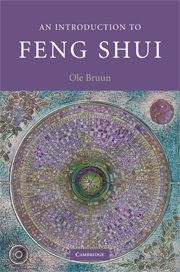Book contents
- Frontmatter
- Contents
- List of illustrations
- 1 Introduction
- 2 A brief history of feng shui
- 3 Feng shui in the context of Chinese popular religion
- 4 Feng shui research
- 5 Cosmological principles, schools of interpretation and the feng shui compass
- 6 Feng shui in the Chinese cityscape: China proper and overseas
- 7 Modern feng shui interpretations and uses
- 8 Environmental concerns
- 9 Feng shui as cultural globalization?
- Bibliography
- Index
1 - Introduction
Published online by Cambridge University Press: 05 June 2012
- Frontmatter
- Contents
- List of illustrations
- 1 Introduction
- 2 A brief history of feng shui
- 3 Feng shui in the context of Chinese popular religion
- 4 Feng shui research
- 5 Cosmological principles, schools of interpretation and the feng shui compass
- 6 Feng shui in the Chinese cityscape: China proper and overseas
- 7 Modern feng shui interpretations and uses
- 8 Environmental concerns
- 9 Feng shui as cultural globalization?
- Bibliography
- Index
Summary
Chinese feng shui is fast becoming a globally known and practised art of placement. Countless articles in newspapers and popular magazines have introduced it to the public, study centres and training courses proliferate and the internet abounds with feng shui homepages and references to the subject. The process of its introduction and spread first in the USA and shortly after in Europe is indeed remarkable; not even the western interest in Buddhism, which flourished in long periods of the twentieth century, can compare with this when measured in the number of book titles. From the first few titles being published in English in the 1980s, the feng shui book market boomed in the late 1990s and into the early 2000s. Today, several thousand popular titles are available in western languages, while spreading further; feng shui literature is now found in nearly all parts of the world.
Feng shui has been put to use in a wealth of popular pursuits, such as to redecorate or clean up homes for greater happiness, balance personality and interior design, improve career opportunities and work performance, focus on simple living, achieve harmonious relations with the environment or just install quick changes to increase the quality of life. Increasingly, however, feng shui has been applied professionally, such as to expand businesses, increase sales, improve the health and performance of employees, renew principles for architecture, better the performance of clinics and hospitals, treat illnesses in children's institutions and so forth.
- Type
- Chapter
- Information
- An Introduction to Feng Shui , pp. 1 - 10Publisher: Cambridge University PressPrint publication year: 2008
- 1
- Cited by

